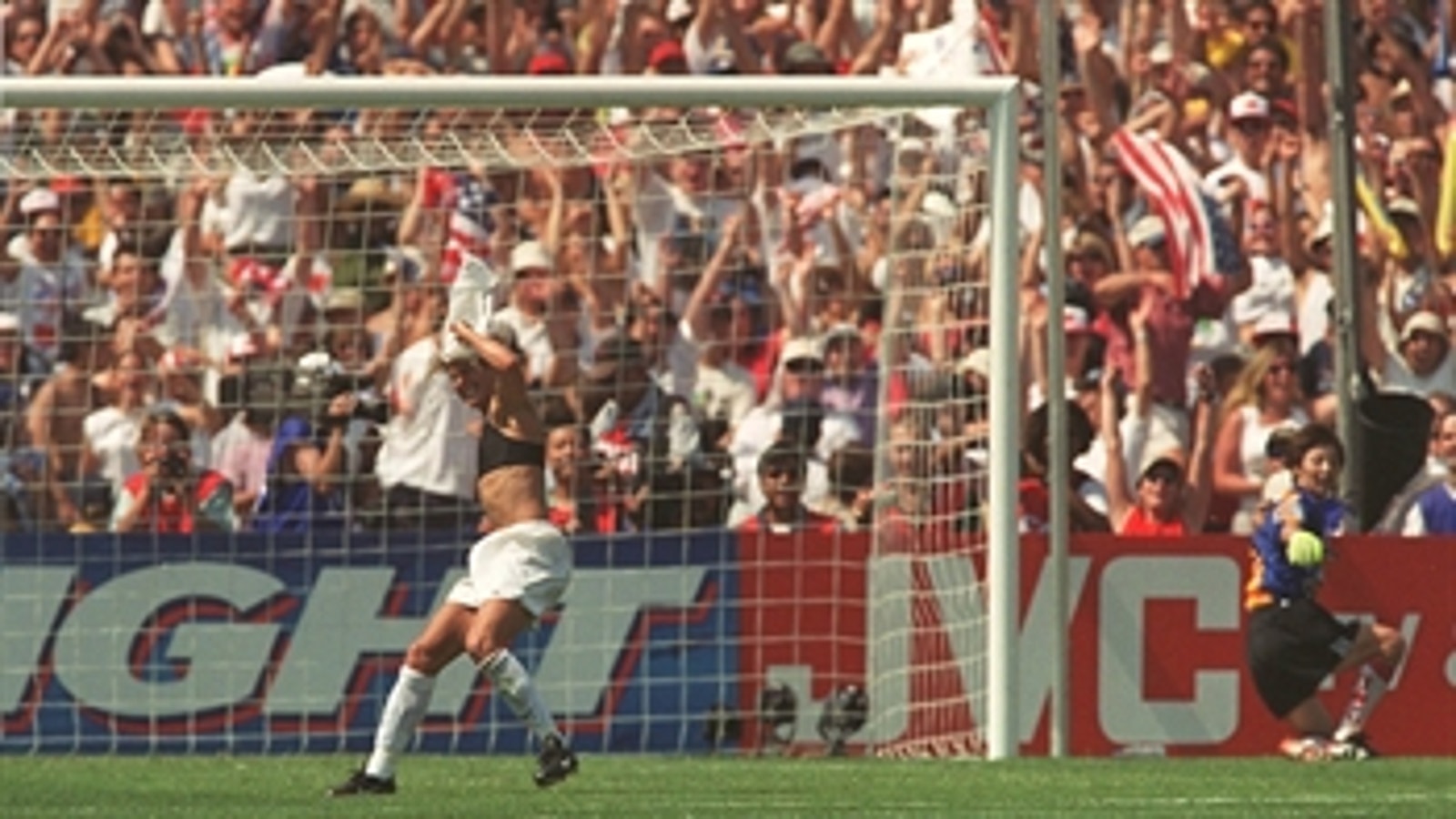It’s coming.
For someone, and their team, and their country, a now-and-forever-more moment is just a week away. It takes a whole team to win a title but someone from either Spain, England, Australia or Sweden is going to find a unique kind of fate smiling upon them.
They’ll become a Women’s World Cup hero. Their critical intervention will take their nation to its first-ever championship.
And nothing will ever be the same again.
ADVERTISEMENT
For that person and her homeland, it will be the equivalent of the Brandi Chastain moment, as we know it in the United States. Even if you weren’t born yet when Chastain smashed home her 1999 penalty kick and ripped off her jersey, it doesn’t matter, you probably still know all about that timeless snapshot of history.
It is suspended still, iconic, almost indescribable in its importance to all that came after it, to the growth of women’s soccer, plus the societal status of the USWNT and the role it occupies in American sports.
If you’re German, it’s the Nia Kuenzer moment. In the 2003 final against Sweden, Kuenzer produced a magnificent header in the eighth minute of extra-time for what remains – probably forever – as the only men’s or women’s World Cup final decided by “golden goal,” with that experimental regulation abolished soon afterward.
The celebrations in Germany were joyous then – and lingering in their impact. Fast-forward to today, and Germany has a booming domestic league, a funding pipeline for the women’s game that is the envy of most other countries, and is a place where women’s soccer players get the kind of rightful recognition that is still, sadly, more of a struggle elsewhere. It is the only team, except for the USA, to have topped the FIFA women’s rankings.
If you’re Japanese, it’s the Homare Sawa or the Saki Kumagai moment. Team Nadeshiko’s penalty shootout win against the United States in 2011 inspired a generation to follow and took on an almost mythical status, lifting the spirits of a nation devastated by the deadly earthquake and tsunami months earlier.
To this day, becoming a member of Japan’s national team squad is a gilded privilege that millions of young girls dream of. Sawa, she of the stunningly brilliant flick to equalize in extra-time and Kumagai, cool-headed scorer of the decisive PK, are Japanese sporting icons until the end of time.
If you’re from Norway, it is the Hege Riise moment, dating all the way back in 1995. Riise scored a beautiful individual goal in a 2-0 win over Germany in the final that year and as a result Norway became one of the first boom nations in women’s soccer. The triumph led to a huge influx of new players at youth levels and national stardom for Riise and her colleagues, alongside Olympic champions from the winter sports disciplines who typically occupied such roles.
F-16 fighter jets escorted the Norway team on its trip back home and despite a population of just 5.4 million, the Scandinavian country continues to churn out some of the best players in the world, including current star Ada Hegerberg – the all-time Women’s Champions League top scorer. That the 2023 team’s exit at “only” the round of 16 stage was considered a major disappointment speaks volumes for such a small nation.
What victory would mean in 2023 depends on which team achieves it. Spain meets Sweden on Tuesday in the first semifinal (coverage begins at 3 a.m. ET, with kickoff at 4 a.m. ET on FOX and the FOX Sports app), then Australia v. England on Wednesday (coverage begins at 5 a.m. ET with kickoff at 6 a.m. ET on FOX and the FOX Sports app). The player who has the starring role becomes a never-to-be-forgotten figure. Heck, even Chastain’s sports bra became one of the most famous pieces of sports memorabilia in modern American history.
The wider impact? The specifics remain to be seen, but if the past is anything to go by it will be monumental.
If Australia is crowned champion it would be one of the most significant sporting peaks for a nation that has a proud history of athletic excellence. Sam Kerr and her teammates spoke before the tournament of replicating a Cathy Freeman scenario, referencing how the 400-meter ace inspired a generation of girl athletes with her win at the 2000 Sydney Olympics.
[Australia’s historic World Cup run uniting a continent: ‘So much more to give’]
For Sweden, this would be rare air. The country has fielded excellent teams on both the men’s and women’s side going back decades, but the closest thing to World Cup glory came when the men made the 1958 final and the women did the same in 2003.
For England, phew. What a question. A country that tortures itself through the adventures of its men’s team every two years at European Championships and World Cups, sparked largely by the jingoistic tabloid media, might find out through the Lionesses that international soccer doesn’t always have to hurt so much.
Things could get regal. Of the England men’s team that won its only major title at the 1966 World Cup, hat-trick scorer Geoff Hurst, midfielder Bobby Charlton and head coach Alf Ramsey were all knighted, to be known thereafter as Sir Geoff, Sir Bobby, etc. Expect King Charles to bestow the equivalent, a Damehood, upon the likes of Rachel Daly or Keira Walsh if the title is secured at Stadium Australia on Aug. 20.
Of the remaining teams, what might happen if Spain wins is the truly fascinating option. Remarkably, the soccer giant did not qualify for the Women’s World Cup until 2015, but is now making a massive mark in the women’s game. Barcelona is one of the best, biggest, most successful and highest-spending club teams in the world. Real Madrid, its hated rival, plans to do something about that success rate.
[Spain talking a big game, backing it up with run to World Cup semifinals]
Money is pouring into the game and Spain could be the place more than any other where crowd figures take a seismic leap. For sports clubs work different over there. If you’re a fan of Madrid or Barca, you bleed their colors on a number of different levels, not just the men’s soccer team, but perhaps also the basketball team, the handball team, the rugby team.
It is already a growing part of the culture that men’s and women’s games are more frequently arranged so that season ticket-holders can attend both, and the world record women’s attendance of 91,648 is held by Barcelona.
A dramatic triumph for Spain, behind a charismatic figure like Salma Paralluelo or Aitana Bonmati, and further growth would become turbocharged.
Winning the World Cup is what every player seeks. Sometimes, they dare to allow their mind to think of it.
“Pressure is a privilege,” Kerr said recently. “And I love pressure.”
“Magical,” said Bonmati, when asked what a World Cup win might feel like.
“You notice from home there has been a big uproar,” Sweden Johanna Rytting Kanerud told Expressen, explaining how becoming aware of the patriotic fervor at home was unavoidable.
“Dare to dream” was forward Alessia Russo’s message to England fans.
It is a dream alright, a fantasy without comparison. And though it feels within touching distance there’s still a lot of work to do.
But for someone, and who knows who the soccer gods will choose, it is about to become reality.
Martin Rogers is a columnist for FOX Sports and the author of the FOX Sports Insider newsletter. Follow him on Twitter @MRogersFOX and subscribe to the daily newsletter.
FIFA WORLD CUP WOMEN trending

Get more from FIFA Women’s World Cup Follow your favorites to get information about games, news and more














